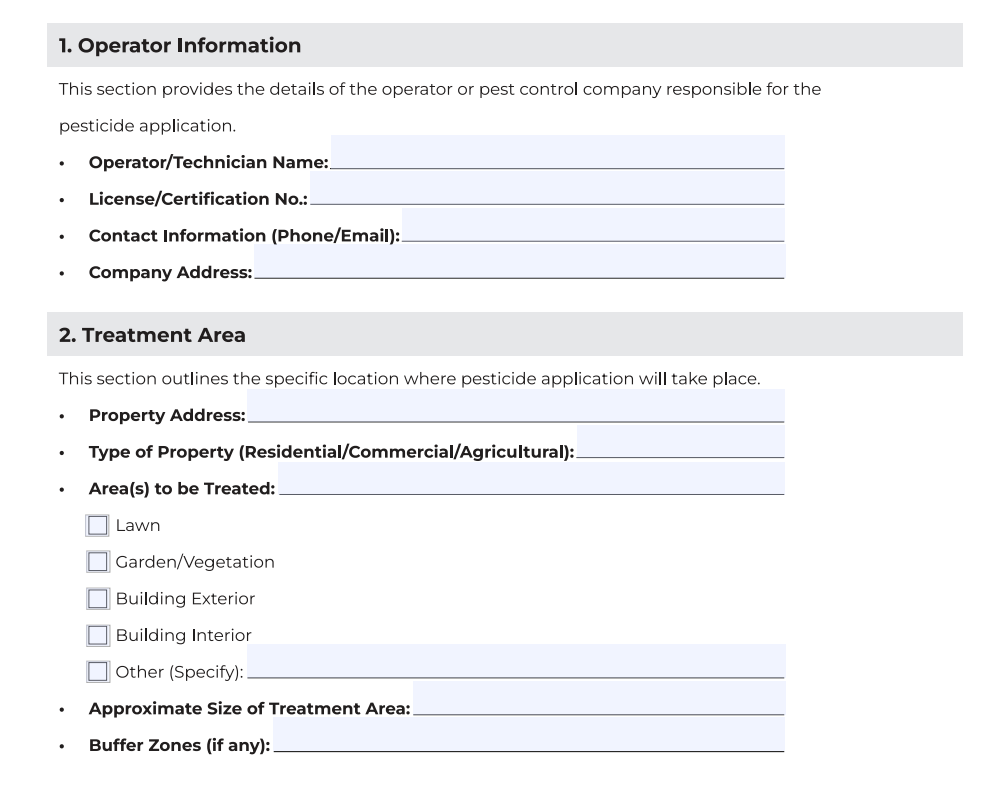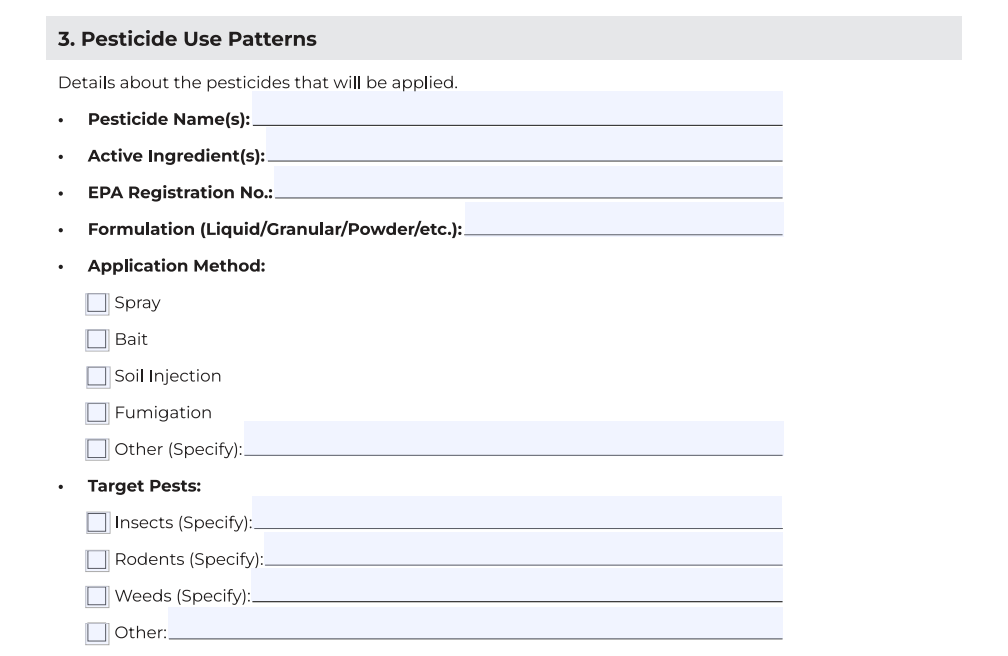Pest Control Notice of Intent Template (+Free PDF Download)
This guide explores the essential elements of a Pest Control Notice of Intent (NOI) and how it safeguards your company and customers.
A Notice of Intent is a formal document that informs relevant parties about upcoming pesticide applications, ensuring transparency and compliance with legal requirements. It helps prevent misunderstandings, protects the environment, and enhances customer trust. To streamline this process and save you time, we offer a free, customizable Pest Control Notice of Intent template designed to meet your needs.
Download our free Pest Control Notice of Intent template below:

How to Use Our Free Pest Control Notice of Intent Template
Customizing our Pest Control Notice of Intent (NOI) template to fit your company’s operations is straightforward. Download the template and easily tailor it to reflect your business’s specific needs.
Operator Information: This section is crucial as it allows you to enter your company’s name and contact details, such as phone number and mailing address.
Treatment Area: Specify the pest management area where the pesticide application will occur.
Pesticide Use Patterns: Detail the types of pesticides and pollutants you plan to use and their active ingredients.
Schedule: Include the planned dates and times for the application.
Updating the template with your company’s branding, including logos and specific legal disclaimers, is important. This customization makes the document professional and ensures compliance with local regulations. Once customized, submit the completed template to the relevant authorities or parties as required.
Next, let’s discuss why your pest control company needs a Notice of Intent.
Why Does My Pest Control Company Need a Pest Control Notice of Intent?
A Pest Control Notice of Intent (NOI) is crucial for several reasons:
Legal and Regulatory Requirements: Compliance with local, state, and federal regulations, such as the Pesticide General Permit (PGP), helps determine the necessity of issuing a Pest Control Notice of Intent, avoiding fines and legal issues.
Building Trust with Customers: Transparently communicating your plans, including pesticide application and safety measures, builds customer trust.
Setting Expectations for Service: Detailing pest control services’ scope, schedule, and methods helps set realistic expectations.
Avoiding Misunderstandings and Disputes: Detailed information on pesticide use and safety procedures helps prevent conflicts and misunderstandings.
What Information Must Be Included in a Pest Control Notice of Intent?
Creating a Pest Control Notice of Intent (NOI) ensures all necessary details and additional information are included for compliance and clarity. Here are the key elements to include:
Date and Time of Service: Clearly state when the pest control service will occur. For example, “Service will be conducted on June 15, 2024, between 9:00 AM and 12:00 PM.”
Location of Service: Specify where the pest control service will take place. Example: “The treatment will be conducted at 123 Main Street, Anytown, USA.”
Type of Pest(s) Being Treated: Identify the specific pests targeted during the service. Example: “This service will address an infestation of termites and bed bugs.”
Treatment Methods: Describe the methods and products used, such as pesticide application, traps, or fumigation. Example: “We will use a combination of bait stations and chemical sprays to eliminate termites.”
Safety Precautions: Provide detailed safety measures to protect residents, pets, and the environment. Example: “Residents should avoid the treated area for 24 hours post-treatment. Ensure pets and children are kept away from the site during this period.”
Preparation Instructions for the Customer: Outline any steps the customer needs to take before the service. Example: “Please remove all food items and cover aquariums before the treatment begins.”
Contact Information: Include contact details for the pest control company for any questions or concerns. Example: “For any inquiries, please contact FirledRoutes Pest Control at (123) 456-7890 or info@fieldroutes.com for any change of information.”How to Use Our Free Pest Control Notice of Intent Template

Including these details in your NOI ensures compliance and builds customer trust and clarity.
Next, let’s explore who is responsible for issuing a NOI form.
Who Is Responsible for Issuing a Pest Control Notice of Intent?
The responsibility for issuing a Pest Control Notice of Intent (NOI) primarily lies with the decision-maker at a pest control company. Large entities may have a responsible corporate officer.
No matter who it is, they must ensure all regulatory requirements are met, including those set by the Environmental Protection Agency (EPA) and state agencies.
Property owners or managers might also be involved in related responsibilities, such as notifying tenants or residents and ensuring everyone is informed about the pesticide application, its schedule, and any safety precautions. For example, in a large apartment complex, the property manager might need to post notices in common areas or distribute letters to residents about any application of pesticides.
Pest Control Company's Responsibility: Ensuring compliance with regulatory requirements.
Property Owner/Manager's Involvement: As a property owner or manager, their role is crucial in notifying tenants or residents about the treatment. Their involvement ensures everyone is informed about the pesticide application, its schedule, and any safety precautions, fostering a sense of responsibility and involvement.
Proper communication between different departments of the pest control business is crucial to avoid misunderstandings and ensure all parties comply with the legal requirements.
How Is a Pest Control Notice of Intent Delivered?
Deliver a Pest Control Notice of Intent (NOI) through various accepted methods: in-person, mail, or email.
Accepted Delivery Methods: In-person, mail, email.
Documentation: Keep records of delivery method and confirmation (e.g., certified mail, email read receipts).
Proper delivery ensures all parties are informed and prepared for the pesticide application, thereby minimizing the risk of misunderstandings or non-compliance.
Next, let’s explore how long before pest control treatment should the Notice of Intent be issued.
How Long Before Pest Control Treatment Should the Notice of Intent Be Issued?
Issuing a Pest Control Notice of Intent (NOI) should follow industry standards and best practices.
For example, university campuses may have specific guidelines requiring notices to be issued well in advance to ensure compliance with their safety protocols.
Industry Standards: Generally, 48 to 72 hours before pesticide application.
Legal Minimums: Vary by region; adhere to local regulations, such as those outlined in the Pesticide General Permit (PGP).
Client Needs: Ensure customers have ample time to prepare.
Next, we’ll discuss the consequences of not issuing a Pest Control Notice of Intent.
What Are the Consequences of Not Issuing a Pest Control Notice of Intent?
Failing to issue a Pest Control Notice of Intent can have significant consequences.
Legal repercussions may include fines and penalties for non-compliance with regulations, such as those enforced by the EPA or state agencies. Neglecting this requirement can damage your reputation and harm client relationships, leading to lost business opportunities. Without proper notification, the risk of disputes and liability increases, potentially resulting in costly legal battles and settlements and possible loss of your permit application.
Legal Repercussions: Fines and penalties for non-compliance.
Reputation Damage: Harm to client relationships and business reputation.
Increased Risk: Higher chance of disputes and liability.
Next, we’ll explore how FieldRoutes can help simplify pest control communications.
Going Beyond Templates: Simplifying Communications with FieldRoutes
FieldRoutes Operations Suite streamlines pest control business operations, improving efficiency and safety. This easy-to-use commercial software supports growth, boosts employee morale, and improves customer experiences.
FieldRoutes also supports businesses without traditional office space, offering virtual solutions for managing operations efficiently.
Key Features:
Drag & Drop Scheduling: Simplifies assigning and managing technician routes, ensuring timely and efficient service delivery.
Optimized Routing: Minimizes travel time and fuel costs, boosting operational efficiency.
Reporting Visuals: Provides clear, actionable insights into business performance, aiding decision-making.
Robust Integrations: Seamlessly integrates with other business tools for comprehensive management.
Simplified Inspections: Streamlines inspection processes, ensuring compliance with safety regulations.
Automated Communication: Sends automated reminders to employees and clients, reducing no-shows and enhancing customer satisfaction.
Pipeline Visibility: A clear view of your sales pipeline helps manage leads and conversions effectively.
Marketing Support: Assists in reaching and engaging more customers.
Payment Management: Streamlines managing pay for services, ensuring timely and accurate billing.
FieldRoutes simplifies operations and contributes to a safer workplace by ensuring compliance, improving scheduling, and automating key processes. Pest control businesses can unlock new levels of efficiency and profitability by using FieldRoutes.
It’s Your Turn Now
We’ve covered the importance of a Pest Control Notice of Intent, detailing its benefits, essential components, and legal requirements. A well-crafted notice protects your business, builds client trust, and can be part of employee training.
Use our free template to streamline this process and ensure compliance.
Schedule a free demo with FieldRoutes Operations Suite to simplify pest control business management.